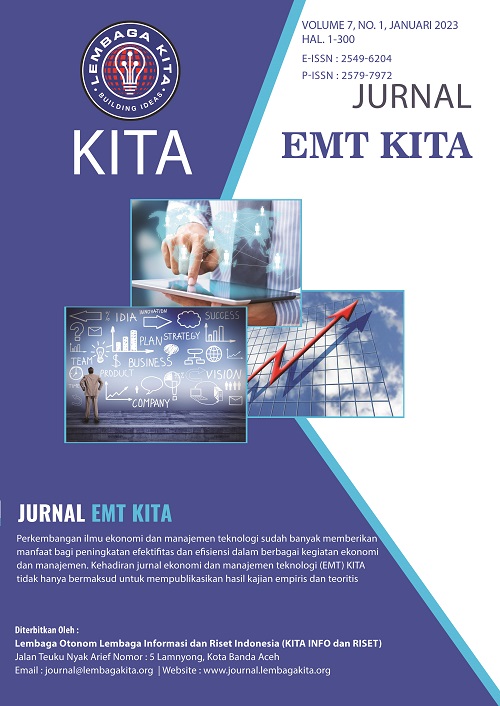Krisis Ekonomi dalam Perspektif Islam
Main Article Content
Abstract
This research discusses descriptively the causes of the economic crisis and the approaches and analyzes of many experts who provide solutions to the economic crisis that has occurred. The occurrence of an economic crisis in Islam cannot be separated from economic practices or activities that are carried out contrary to Islamic values, such as the act of consuming usury, monopoly, corruption, and other malpractice actions. Islamic Economics and the Economic Crisis are an approach and analysis. provide solutions to the current economic crisis. Although there are differences, in general the key to solving the crisis is to eliminate the system of interest (usury) in the economy. In terms of banking, Islamic economics has provided solutions (alternatives) to avoid the practice of usury (interest) in the banking process. The solution is in the form of a Mudharabah product based on a profit sharing ratio expressed in the form of a percentage between shahibul mal and mudharib.
Downloads
Article Details

This work is licensed under a Creative Commons Attribution-NonCommercial-NoDerivatives 4.0 International License.
An author  who publishes in the  Jurnal Manajemen Teknologi agrees to the following terms:
- Author retains the  copyright and grants the journal the right of first publication of  the work simultaneously licensed under the Creative Commons Attribution License that allows others to share the work with an acknowledgement of the work's authorship and initial publication in this journal.
- Author is  able to enter into separate, additional contractual arrangements for the non-exclusive distribution of the journal's published version of the work (e.g., post it to an institutional repository or publish it in a book)with the  acknowledgement of its initial publication in this journal.
- Author is  permitted and encouraged to post his/her  work online (e.g., in institutional repositories or on their website) prior to and during the submission process, as it can lead to productive exchanges, as well as earlier and greater citation of the published work (See The Effect of Open Access).
 Jurnal Ekonomi Manajemen Teknologi (EMT) KITA by http://journal.lembagakita.org/index.php/emt/index is licensed under a Creative Commons Attribution-ShareAlike 4.0 International License.
Jurnal Ekonomi Manajemen Teknologi (EMT) KITA by http://journal.lembagakita.org/index.php/emt/index is licensed under a Creative Commons Attribution-ShareAlike 4.0 International License.
References
Antonio, M. S. I. (2001). Bank Syariah: dari teori ke praktik. Gema Insani.
Republika. (2010). Bank di Amerika terapkan Prinsip Syari’ah”, Harian Republika, Diakses tanggal 19 Juni 2010.
Chapra, M. U. (2000). Sistem moneter islam. Gema Insani.
Hamidi, M. L. (2007). Gold dinar: sistem moneter global Yang Stabil dan Berkeadilan. Senayan Abadi Publishing.
Sudarsono, H. (2018). Bank dan Lembaga Keuangan Syariah; deskripsi dan ilustrasi. Ekonisia FE UII.
Ismawan, I. (1919). Di Bawah Cengkraman IMF: Peran IMF Dalam Krisis Ekonomi Indonesia. Solo: Pondok Edukasi.
Lekachman, R., & Van Loon, B. (2008). Kapitalisme Teori dan Sejarah Perkembangannya. Yogyakarta: Resist Book.
Perwataatmadja, K. A., & Tanjung, H. (2007). Bank Syariah: Teori, Praktik, dan Peranannya. Jakarta: Celestial Publishing.
Madjid Abdul Shabri alumni Bidang Ekonomi pada International Islamic University, Malaysia (IIUM). Sumber: http://www.bmtlink.web.id/Wacana180502.htm.
Imansyah, M. H. (2008). Krisis keuangan di Indonesia, dapatkah di ramalkan?. Elex Media Komputindo.
Rusdianta Aam Slamet. (2009). Ekonomi Islam Substantif, Bogor: Lembaga Penelitian
Salim M., Profit Sharing vs Interest (sebuah kajian perbandingan), Ponorogo: CIOS.
Yusanto, M. I., Hakim, C. M., Saidi, Z., Abdur-Razzaq, V., & UI, S. (2001). Dinar Emas, Solusi Krisis Moneter.
Sukirno, S. (1995). Pengantar teori makroekonomi edisi kedua. Jakarta: Bina Grafika.
Sulaiman, T. A. M., & Sitanggal, A. U. (1986). Menanggulangi krisis ekonomi secara Islam. Alma'arif. Pemberdayaan Masyarakat (LPPM) STIE Tazkia.

